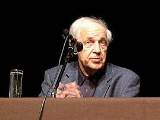
Pierre Boulez
Overview
Composer
A composer is a person who creates music, either by musical notation or oral tradition, for interpretation and performance, or through direct manipulation of sonic material through electronic media...
of contemporary classical music
Contemporary classical music
Contemporary classical music can be understood as belonging to the period that started in the mid-1970s with the retreat of modernism. However, the term may also be employed in a broader sense to refer to all post-1945 modern musical forms.-Categorization:...
, a pianist
Pianist
A pianist is a musician who plays the piano. A professional pianist can perform solo pieces, play with an ensemble or orchestra, or accompany one or more singers, solo instrumentalists, or other performers.-Choice of genres:...
, and a conductor
Conducting
Conducting is the art of directing a musical performance by way of visible gestures. The primary duties of the conductor are to unify performers, set the tempo, execute clear preparations and beats, and to listen critically and shape the sound of the ensemble...
.
Boulez was born in Montbrison, Loire
Montbrison, Loire
Montbrison is a commune in the Loire department in central France.The commune gives its name to the popular blue cheese Fourme de Montbrison which has been made in the region for centuries.-History:...
, France. As a child he began piano lessons and demonstrated aptitude in both music
Music
Music is an art form whose medium is sound and silence. Its common elements are pitch , rhythm , dynamics, and the sonic qualities of timbre and texture...
and mathematics
Mathematics
Mathematics is the study of quantity, space, structure, and change. Mathematicians seek out patterns and formulate new conjectures. Mathematicians resolve the truth or falsity of conjectures by mathematical proofs, which are arguments sufficient to convince other mathematicians of their validity...
. He pursued the latter at Lyon
Lyon
Lyon , is a city in east-central France in the Rhône-Alpes region, situated between Paris and Marseille. Lyon is located at from Paris, from Marseille, from Geneva, from Turin, and from Barcelona. The residents of the city are called Lyonnais....
before pursuing music at the Paris Conservatoire under Olivier Messiaen
Olivier Messiaen
Olivier Messiaen was a French composer, organist and ornithologist, one of the major composers of the 20th century. His music is rhythmically complex ; harmonically and melodically it is based on modes of limited transposition, which he abstracted from his early compositions and improvisations...
and the wife of Arthur Honegger
Arthur Honegger
Arthur Honegger was a Swiss composer, who was born in France and lived a large part of his life in Paris. He was a member of Les six. His most frequently performed work is probably the orchestral work Pacific 231, which is interpreted as imitating the sound of a steam locomotive.-Biography:Born...
, Andrée Vaurabourg
Andrée Vaurabourg
Andrée Vaurabourg was a French pianist and teacher. She was the wife of Swiss-French composer Arthur Honegger , whom she met at the Paris Conservatoire in 1916. Honegger married her in 1926 on the condition that they live in separate apartments...
.
Through Messiaen, Boulez discovered twelve-tone technique
Twelve-tone technique
Twelve-tone technique is a method of musical composition devised by Arnold Schoenberg...
— which he would later study privately with René Leibowitz
René Leibowitz
René Leibowitz was a French composer, conductor, music theorist and teacher born in Warsaw, Poland.-Career:...
— and went on to write atonal
Atonality
Atonality in its broadest sense describes music that lacks a tonal center, or key. Atonality in this sense usually describes compositions written from about 1908 to the present day where a hierarchy of pitches focusing on a single, central tone is not used, and the notes of the chromatic scale...
music in a post-Webernian
Anton Webern
Anton Webern was an Austrian composer and conductor. He was a member of the Second Viennese School. As a student and significant follower of Arnold Schoenberg, he became one of the best-known exponents of the twelve-tone technique; in addition, his innovations regarding schematic organization of...
serial
Serialism
In music, serialism is a method or technique of composition that uses a series of values to manipulate different musical elements. Serialism began primarily with Arnold Schoenberg's twelve-tone technique, though his contemporaries were also working to establish serialism as one example of...
style.
Quotations
[A]ny musician who has not experienced - I do not say understood, but truly experienced - the necessity of dodecaphonic music is USELESS. For his whole work is irrelevant to the needs of his epoch.![]()
Emphasis in the original. From "Eventuellement..." (1952), translated as "Possibly..." in Stocktakings from an Apprenticeship, Oxford: Oxford University Press, 1991, p.113. ISBN 0193112108
Creation exists only in the unforeseen made necessary.![]()
From "Eventuellement..." (1952), translated as "Possibly..." in Stocktakings from an Apprenticeship, Oxford: Oxford University Press, 1991, p.133 ISBN 0193112108
Stupid, stupid, stupid!![]()
On the music of Giuseppe Verdi|Giuseppe Verdi. Quoted in Boulez: Composer, Conductor, Enigma by Joan Peyser, New York: Schirmer Books, 1976.

